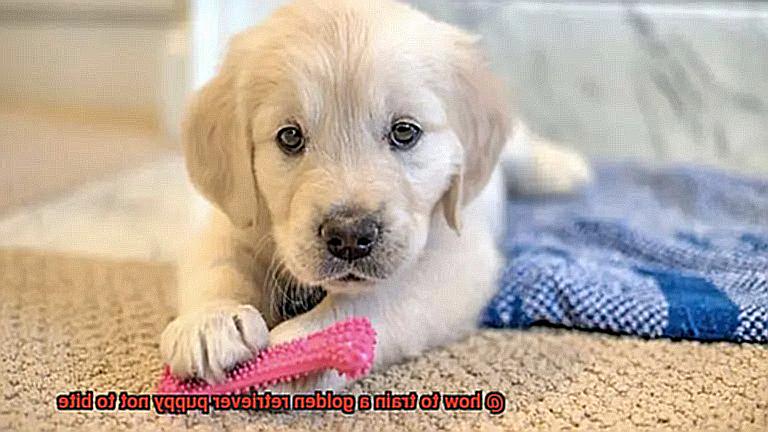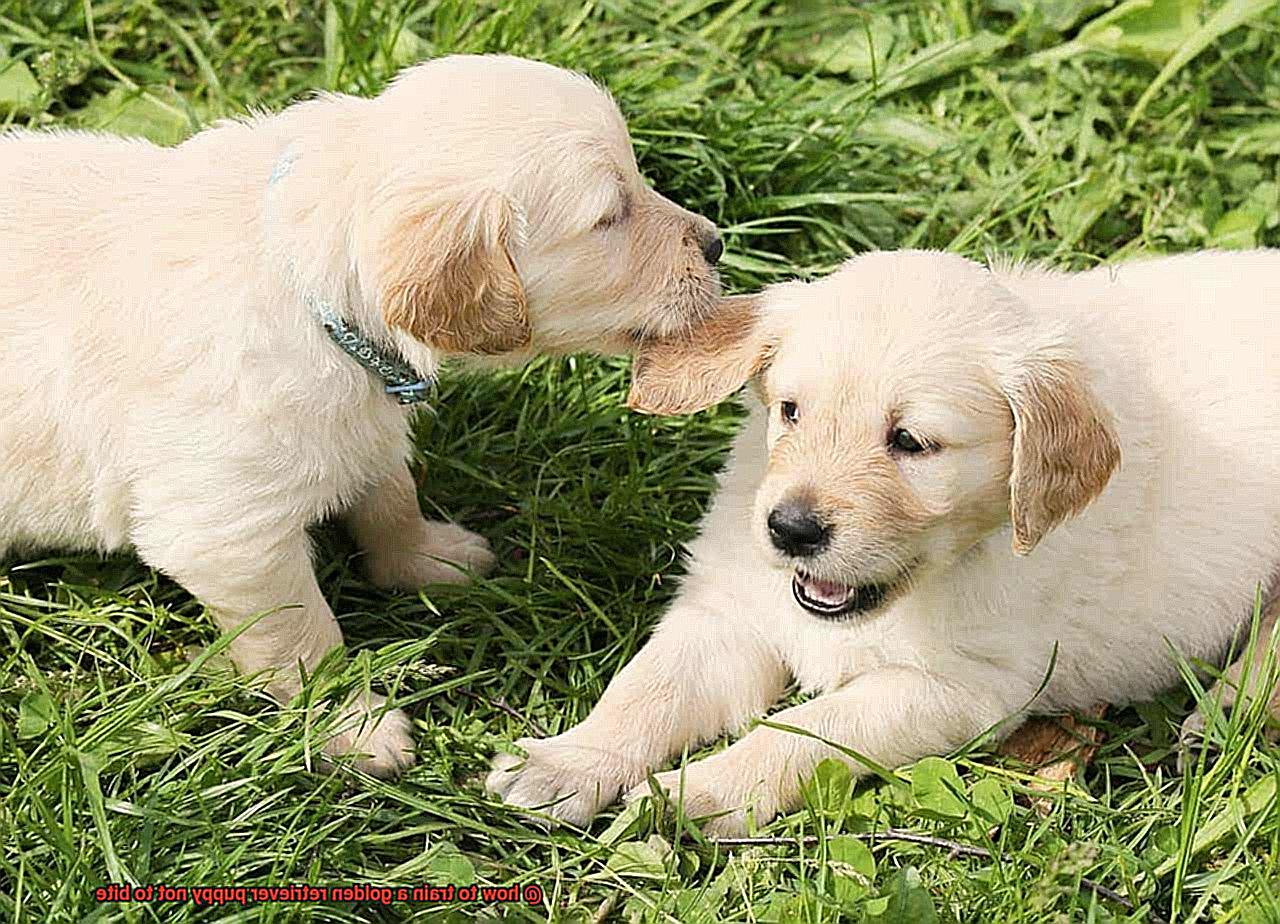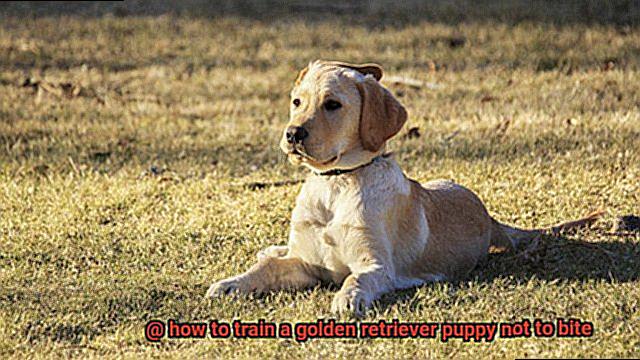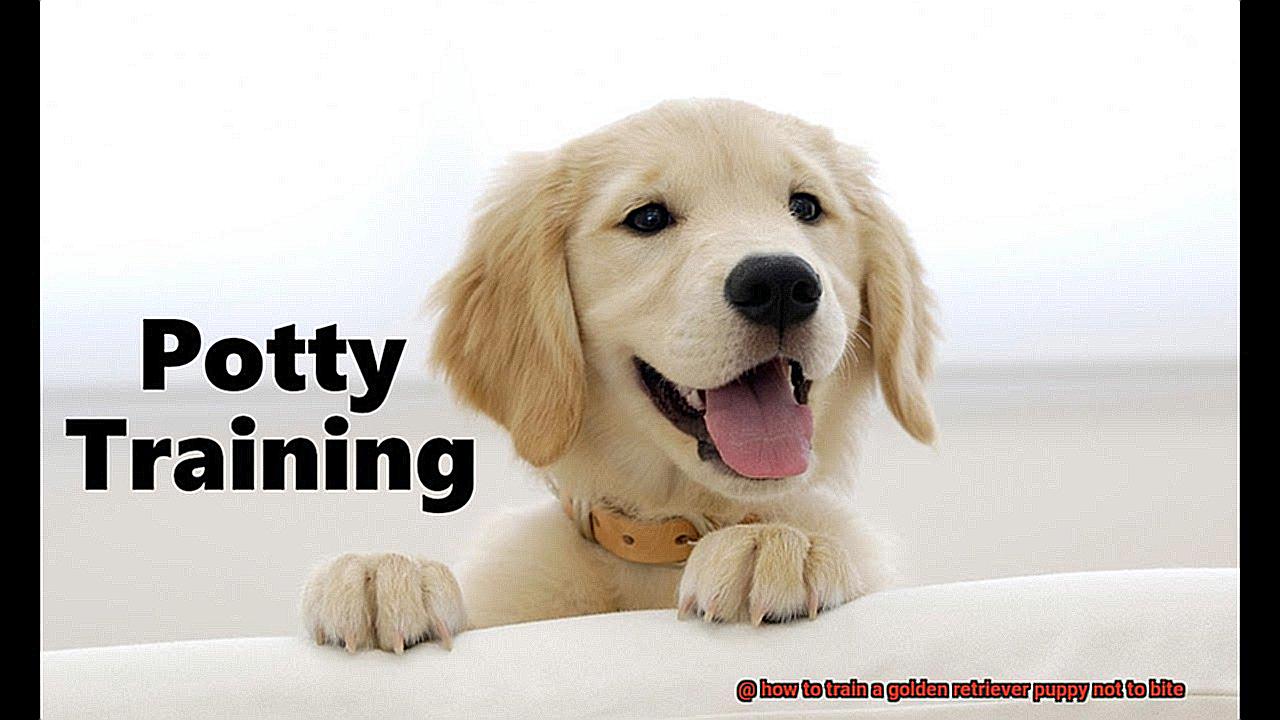Do you find yourself constantly dodging your golden retriever puppy’s sharp teeth? These playful pups have a natural inclination to explore their surroundings with their mouths, but that doesn’t mean you have to suffer through painful bites and scratches. Luckily, training your golden retriever puppy not to bite is a straightforward process.
In this blog post, we’ll dive into the most effective strategies for teaching your furry friend how to control their biting impulses. From yelping and redirection techniques to positive reinforcement and socialization approaches, there are plenty of methods at your disposal to help transform your pup into a well-behaved and content companion.

But before we get started on the training tips, it’s important to understand why puppies bite in the first place. Teething discomfort, boredom, and anxiety are just a few of the reasons why your pup may be nipping at you. By identifying the root cause of their behavior, you can tailor your training approach accordingly.
So if you’re ready to put an end to those pesky puppy bites once and for all, keep reading – we’ve got all the expert advice and insider knowledge you need to start training your golden retriever puppy today.
Redirecting Biting Behavior to Appropriate Chew Toys
Contents
- 1 Redirecting Biting Behavior to Appropriate Chew Toys
- 2 Consistency and Patience in Training a Golden Retriever Puppy Not to Bite
- 3 Positive Reinforcement as an Effective Approach
- 4 Scolding or Punishing a Puppy for Biting Can Make the Problem Worse
- 5 Providing Physical and Mental Stimulation for Your Puppy
- 6 Training Exercises – Obedience and Agility Training
- 7 Conclusion
It’s perfectly natural for puppies to explore their surroundings with their mouths. However, it’s essential to redirect this behavior towards appropriate chew toys before it becomes a habit. In this blog post, we’ll guide you through redirecting your Golden Retriever puppy’s biting behavior to chew toys, ensuring they’re safe and well-behaved.
The first thing to do is provide your puppy with high-quality, safe chew toys. This will encourage them to chew on the toys instead of your hands, feet, or furniture. It’s best to offer a variety of toys with different textures, shapes, and sizes to keep them interested and engaged.
Supervision is crucial when introducing chew toys to your Golden Retriever puppy. Show them how to play with the toys by playing with them yourself. You can also add some flavor or scent to make the toys more appealing. Your puppy will soon learn that these toys are more fun than inappropriate objects.
If your puppy bites you or anything else they shouldn’t be biting, immediately redirect their attention to a chew toy. Say “no” firmly but gently and give them the chew toy. Praise them when they start chewing on the toy and continue playing with them. Positive reinforcement is an effective way of training your puppy not to bite.
Consistency is key when redirecting your Golden Retriever puppy’s biting behavior. Never allow biting sometimes and not others as this can confuse your puppy. Always redirect their attention towards the chew toy and praise them when they behave correctly.
In addition to redirecting biting behavior, it’s essential to provide enough physical and mental stimulation for your Golden Retriever puppy. Biting can be a sign of boredom or excess energy, so ensure you provide enough exercise and playtime. Training exercises like obedience and agility training can also help improve their focus and impulse control.
Consistency and Patience in Training a Golden Retriever Puppy Not to Bite
During playtime, puppies sometimes have a tendency to nip and bite. Don’t worry – this is a common behavior that can be addressed with consistency and patience.
Consistency means setting clear boundaries and consistently reinforcing them. Redirecting your puppy’s attention to appropriate chew toys whenever they start to nip or chew on clothing or body parts can help them understand that biting humans is not acceptable. Remember, it’s important to establish these boundaries early on to prevent the behavior from becoming a bigger issue down the line.
Patience is also essential when training a puppy not to bite. Puppies are still learning about their surroundings, so it may take some time for them to fully understand what is expected of them. Remaining calm and consistent in your approach, even when your pup seems stubborn or resistant to training, is crucial for achieving success.

Positive reinforcement techniques like praise and treats are also helpful in encouraging good behavior and reinforcing boundaries. Steer clear of physical punishment or aggressive methods as these can be counterproductive and may even lead to increased biting behavior.
Positive Reinforcement as an Effective Approach
Rather than punishing undesirable behavior, positive reinforcement focuses on rewarding desirable behavior. Specifically, when it comes to biting, this means rewarding your puppy when they exhibit gentle and non-aggressive behavior towards people or other animals.

A great way to use positive reinforcement is through treats and praise. For instance, if your pup approaches someone without nipping or biting, offer them a treat or verbal praise. This helps your furry friend associate good behavior with positive outcomes, making it more likely that they’ll repeat that behavior in the future.

Another effective way to use positive reinforcement is through playtime and socialization. Golden retrievers are social creatures by nature and enjoy playing with other dogs and people. By exposing your puppy to different environments and individuals, they learn how to interact appropriately without resorting to biting or nipping.
It’s essential to maintain consistency in your positive reinforcement approach. This means rewarding good behavior always and never rewarding undesirable behavior. This consistency helps your pup understand which behaviors are acceptable and which ones aren’t.
Scolding or Punishing a Puppy for Biting Can Make the Problem Worse
Punishing or scolding your furry friend for this behavior can actually make the problem worse. In fact, it can cause a breakdown in trust and a strained relationship between you and your puppy.
When your puppy is scolded or punished for biting, they might become fearful or anxious around you. This, in turn, could make them view you as someone to be avoided rather than trusted. Additionally, punishment may reinforce the behavior as the puppy may view it as attention from their owner, even if it is negative attention.
Instead of resorting to punishment, it’s important to redirect your puppy’s biting behavior with positive reinforcement techniques. One effective technique is to provide them with appropriate toys and chew items to redirect their biting behavior. When your puppy does bite, immediately redirect them to a toy or chew item and praise them when they use it.
Consistency is key when training your puppy not to bite. It’s important that everyone in the household uses the same redirection and positive reinforcement techniques to ensure that your pup understands what is expected of them. With patience and consistent training, your golden retriever puppy can be trained not to bite and will become a well-behaved and loving companion.
Providing Physical and Mental Stimulation for Your Puppy
Your Golden Retriever puppy is a bundle of energy and requires proper physical and mental stimulation to keep them happy and healthy. If you’ve been struggling with your little furball’s biting behavior, it might be due to boredom or excess energy. But fret not; there are plenty of ways to provide your pup with the right activities that will reduce this behavior.
Firstly, regular exercise is essential for Golden Retrievers. These active dogs love long walks, runs, and playing fetch. Daily walks and play sessions can help your puppy burn off excess energy and keep them mentally stimulated.
Another way to challenge your puppy’s mind is through training sessions and interactive toys. Golden Retrievers are intelligent dogs that love to learn new things. Short training sessions throughout the day can provide mental stimulation and teach your puppy appropriate behavior. Interactive toys such as puzzle feeders and treat-dispensing toys offer a fun challenge for your pup’s mind.
Socialization is also vital for Golden Retriever puppies. Introducing them to new people, animals, and environments from an early age helps prevent fear-based aggression and biting behavior. Puppy socialization classes and playdates with other friendly dogs are excellent ways to provide mental stimulation and burn off excess energy.
Training Exercises – Obedience and Agility Training
While it’s certainly endearing to watch them explore and play, it can be frustrating when they start biting and nipping at everything in sight – including your hands and clothes.
Luckily, obedience and agility training can help you tackle this problem head-on. These types of training exercises are essential tools for teaching your puppy discipline, self-control, and good manners, which can ultimately lead to a reduction in biting behavior.
Obedience training is all about teaching your puppy basic commands like sit, stay, come, and heel. By mastering these commands, your puppy will learn to respect you as their pack leader and understand that biting is not acceptable behavior. For example, if your puppy starts nibbling on your hand or clothing, you can use the “sit” command to redirect their attention and reinforce positive behavior.
Agility training takes things up a notch by teaching your puppy how to navigate through obstacle courses. This type of training provides a fun way for your puppy to burn off excess energy while also improving their physical fitness and coordination. Additionally, by following commands and focusing their attention, your puppy may be less likely to resort to biting as a way to relieve boredom or frustration.
Conclusion
In conclusion, training your golden retriever puppy not to bite is a vital step towards cultivating a happy and well-behaved furry friend. Understanding why puppies bite, such as teething discomfort, boredom, or anxiety, is crucial in tailoring your training approach.
Redirecting biting behavior towards appropriate chew toys through supervision and positive reinforcement techniques is an effective way to prevent your puppy from developing a habit of biting. Consistency, patience, and positive reinforcement are essential when it comes to training your pup not to bite.
Punishing or scolding them for their behavior can make the problem worse by causing fear or anxiety around you. Instead, provide physical and mental stimulation through regular exercise, training sessions, interactive toys, socialization with other dogs and people, obedience/agility training.
Mastering basic commands like sit, stay, come, and heel through obedience training and navigating obstacle courses through agility training will help your pup learn discipline and self-control. With consistent redirection towards appropriate chew toys during biting episodes using positive reinforcement techniques like praise and treats can lead to reduced biting behavior.
In summary, with patience and consistent training tailored to the individual needs of your furry friend can help transform them into a well-behaved companion that you’ll be proud of.









